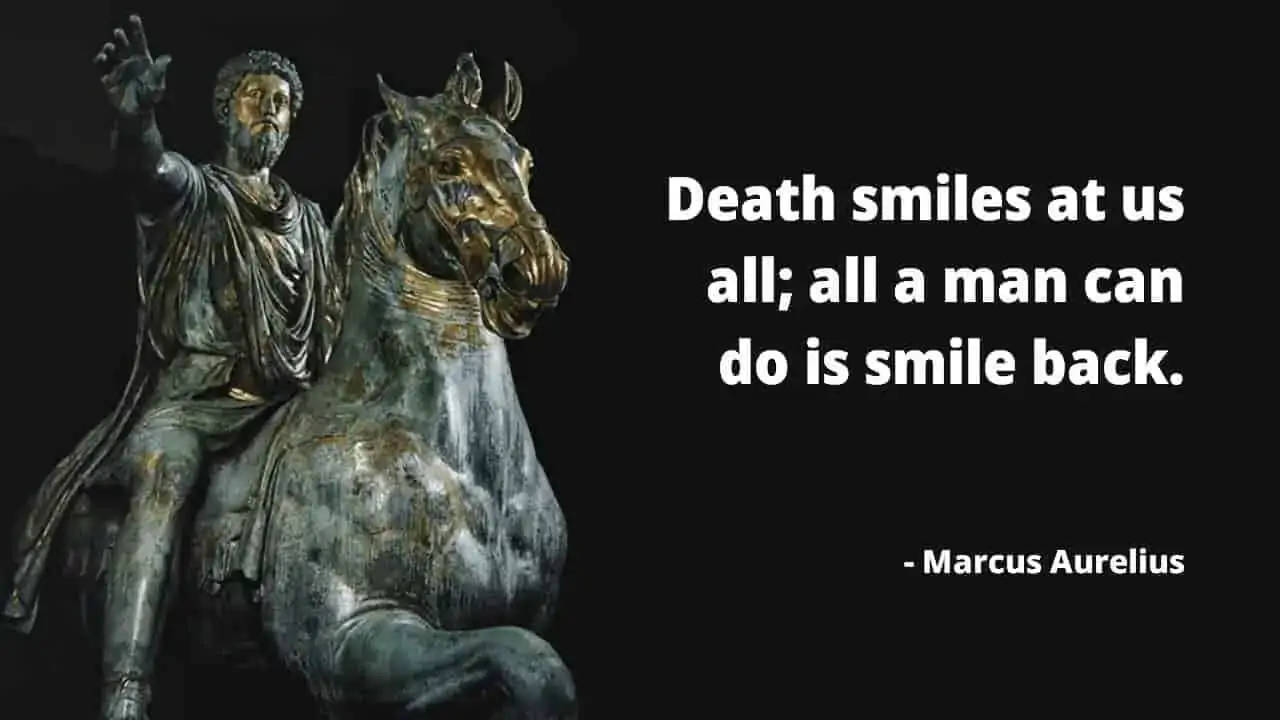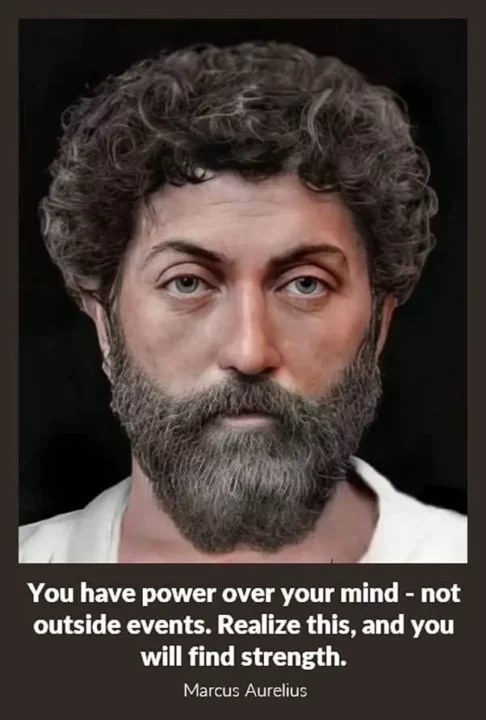Today's Saturday • 15 mins read
Marcus Aurelius was the last of the five good Roman emperors to rule during the Empire’s golden age, which began with Nerva assuming power in 96 and ended with Marcus’ death in 180.
His was the story of a man born into power and aristocracy, rising to be the world’s most powerful person at the time, but remained a virtuous Stoic until his last breath.
Marcus Aurelius is also one of the world’s most well-known, and the last of the ancient, Stoics. His legacy, the book Meditations, is replete with impeccable, timeless lessons. With the passage of time, this book elevated him to the status of a legend.
“Marcus is unmistakably a Stoic, yet he never proclaims his allegiance to Stoicism, nor does he depend on the authority of the founders of his school to support his convictions.”
— Martin Hammond
Marcus Aurelius’s life is evidence that power doesn’t necessarily corrupt a man to become a cold-blooded and evil despot.
Today, many remember Marcus Aurelius as The Philosopher King.

Marcus Aurelius’ Upbringing
Born as Marcus Annius Verus, son of a noble family in Rome, Marcus Aurelius was close to the seat of power throughout his life.
Marcus’ path to becoming the most powerful person in Rome began with Emperor Hadrian (117-138), his adoptive grandfather.
Hadrian gave the young Marcus the nickname Verissimus, meaning “The Truthful One” and planned for him to become Emperor one day.
Hadrian made plans for who would rule after him, and adopted Lucius Aelius Caesar. But Aelius died unexpectedly within a year, in 138, forcing Hadrian to search for his successor again.
Aelius had a son, Lucius Verus, who later became the first king to co-rule the Roman Empire.
Hadrian next adopted Antoninus Pius, a 51-year-old respected senator, and Marcus’ uncle, to succeed him. Hadrian did not expect Pius to rule for long since the average life of Roman emperors at the time was around 53 years.
So, he once more played the puppeteer, making Pius adopt Marcus Aurelius and Lucius Verus as the future emperors, after Pius.
While Hadrian was emperor, he had Marcus Aurelius follow him closely, knowing he was the second next in line to reign.
Marcus’s claim to the throne became even stronger when he married Pius’s daughter, Faustina the Younger, in 145.
In 138, Hadrian died, and Pius became the next Emperor. Despite his age and Hadrian’s expectations, Pius reigned for 23 long years, until his death in 161. His rule was relatively peaceful.
After Pius died, Marcus became the emperor and made it so that his adoptive brother, Lucius Verus, became a co-emperor.
This was the first time in Roman history that two emperors ruled it with equal power.
Lucius Verus died in 169, only eight years into their reign as co-emperors, leaving Marcus to rule the empire until 180. Their equal reign worked in large part because of Lucius’s respect for Marcus and his understanding that Marcus had more power, even though they were equal emperors.
Later, Marcus Aurelius had his son, Commodus, follow him closely to learn how to rule the empire. Towards the end of his reign, in 177, Aurelius made Commodus his co-emperor, and once again, Rome had two emperors.
First Mentor of Marcus Aurelius: Fronto
Marcus was taught by many mentors.
Since Marcus was born into a noble family, he had access to the best education any Roman could have, right from his birth. Hadrian, his adoptive grandfather, and Pius, his adoptive father, hand-picked tutors for Marcus and Lucius because they planned Marcus to become Emperor one day.
One of his first tutors, Marcus Cornelius Fronto, was an orator par excellence of African origin. He focused on literature and its speech and taught the boys rhetoric and grammar. Marcus Aurelius was eighteen when Fronto got hired.
Fronto was highly esteemed for his vast knowledge of Latin and Greek literature, as well as his work as a legal advocate and his senate position in Greek politics. He maintained close relationships with both Marcus and Lucius until his death around 166.
When Fronto became Marcus’ tutor, it seems the young boy took a fancy to him and expressed his love through letters.
First discovered as a palimpsest in libraries in Milan and in the Vatican in the early 19th century, old letters between Fronto and Marcus Aurelius attest to the love the two men shared.
The two exchanged letters until Fronto’s death, of which five books of letters to Marcus as Caesar, and four to him as Augustus, survive today. Fronto’s famous speeches only survive in parts. Fronto’s letters are available as a book today.
While Fronto indeed had a significant effect on Marcus Aurelius’s life, especially in shaping his rhetoric, Aurelius’s greatest teacher was Rusticus.
“In [rhetoric] he had Cornelius Fronto and Claudius Herodes for teachers, and, in [philosophy], Junius Rusticus and Apollonius of Nicomedeia. Both were advocates of Zeno. As a result, great numbers pretended to pursue philosophy, hoping that they might be enriched by the emperor. Most of all, however, Marcus owed his advancement to his own natural gifts; for even before he associated with those teachers he had a strong impulse towards virtue” — Cassius Dio 72[71]
The Schooling of Marcus Aurelius: Rusticus
Quintus Junius Rusticus (100 – 170) was a Roman teacher and politician. He was the main philosophical teacher of Marcus. Rusticus was an accomplished Stoic philosopher of his time.
Rusticus, along with Apollonius of Nicomedeia, led Marcus Aurelius deep into Stoicism. In his years of mentorship, Rusticus did not stray from pointing out Marcus’ mistakes.
Marcus wrote about his education from Rusticus in Meditations:
“From Rusticus [I learned] to become aware of the fact that my character needed improvement and training; and not to be led aside into an argumentative sophistry; nor compose treatises on speculative subjects, or deliver pretentious sermons, or show-off with ostentatious displays of self-discipline or generosity; and to eschew rhetoric, poetry, and refined language; and not to lounge about the house in my toga, or to let myself go in this sort of way; and to write letters simply, like his own letter written to my mother from Sinuessa; to show oneself ready to be reconciled to those who have lost their temper and trespassed against one, and ready to meet them halfway as soon as ever they seem to be willing to retrace their steps.” — Marcus Aurelius, Meditations I.7
Rusticus’ mentorship made Marcus far more aware of his mental workings, inner state, and relationship with the world around him. This paved Marcus’ path to becoming a Stoic philosopher himself.
Rusticus taught Marcus that he must contribute to the world as a philosopher and also play an active role as a dutiful citizen.
He had a great influence over Marcus. When Marcus became emperor, he kept Rusticus as consul.
Rusticus had most likely traveled to Greece to attend a few lectures of Epictetus. He introduced Marcus to the world of the Stoic sage, and even gave him a copy of his notes on Epictetus’ lectures (hypomnemata).
“To make the acquaintance of the Memoirs of Epictetus, which he supplied me with out of his own library.” — Meditations, 1.7
The undeniable impact of Epictetus’ teachings shows up in Marcus’ Meditations.
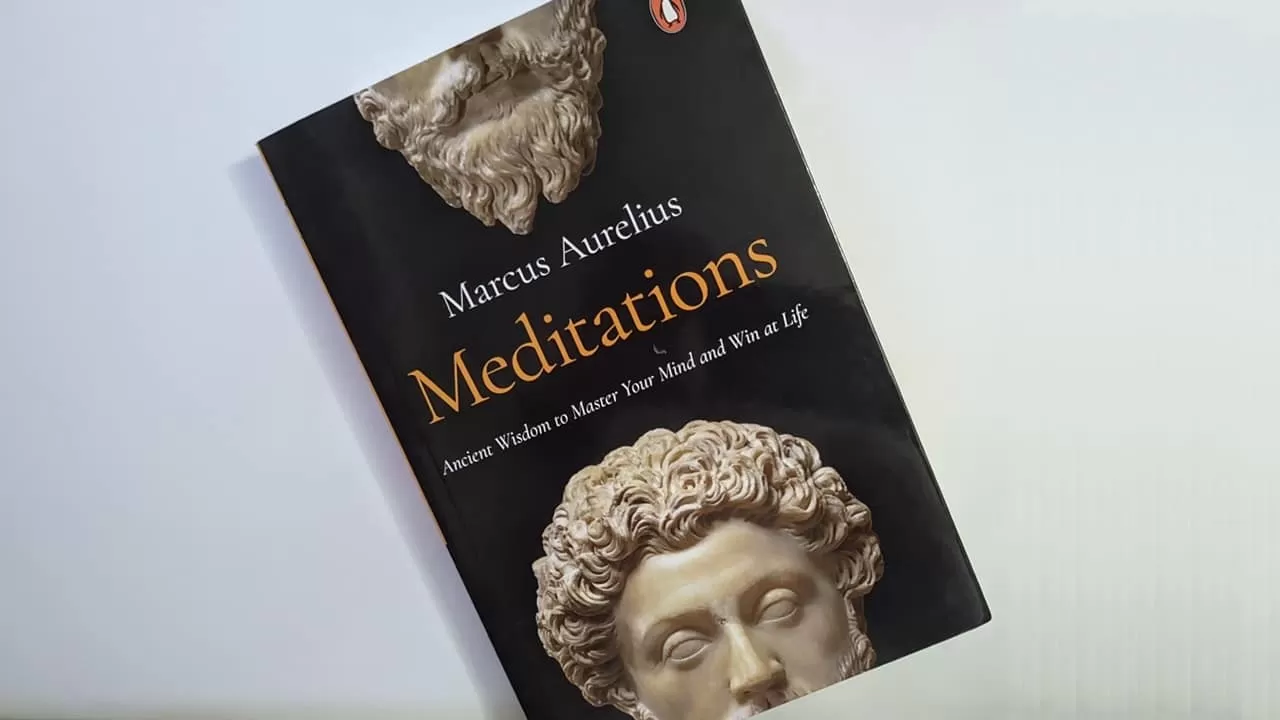
Epictetus’ Impact On Marcus Aurelius
Epictetus was the most influential Stoic teacher of the Roman Imperial period. Marcus never met Epictetus in person. When Emperor Domitian exiled Epictetus from Rome in 93, he permanently migrated to Nicopolis in Greece, where he lectured until his death.
Marcus was a fresh teenager when Epictetus died in 135, but he had many spiritual and educational ties to Epictetus. Marcus considered himself to be a pupil of Epictetus.
How did Marcus imbibe Epictetus’ influence in his life?
Emperor Hadrian was quite a philosopher himself, though not a Stoic. He was a good friend of Epictetus, and Marcus may have received some of his knowledge about Epictetus from Hadrian.
Rusticus was an ardent follower of Epictetus and likely met him, and studied for some time under him, during his lifetime. Rusticus encouraged Marcus to read and follow Epictetus.
There is a clear influence of Epictetus’ writings in Meditations.
“It is fair to say that the essential substance of Marcus Aurelius’ Meditations comes from Epictetus.” — Hadot, Philosophy as a Way of Life, 195
Many of Epictetus’ teachings are lost today. Epictetus probably never wrote down anything. The Discourses and Handbook were written by his pupil, Arrian of Nicomedia.
Arrian, respected as a highly intelligent philosopher himself and a personal friend of Hadrian, took copious notes at Epictetus’s lectures and published them. Arrian wrote eight of these discourses, but only four remain today.
Marcus mentions Epictetus many times, quoting from The Discourses. There are also moments when Marcus is writing about Epictetus, but since he often does not explicitly name him, it is uncertain where these readings come from.
Marcus attributes a particularly pithy saying to Epictetus that is not found in The Discourses available today:
“You are a little soul carrying a corpse around, as Epictetus used to say.” — Meditations, 4.41

The Stoic Philosophy of Marcus Aurelius
Stoicism as we now know is not the same as it was in the times of Zeno, Epictetus, and Marcus. A Stoic then was defined by their toughness of character, a life of austerity, and an unnatural coldness toward family, power, reputation, wealth, and health.
So, in the ancient Roman world, Marcus Aurelius was both a Stoic (a follower of Stoicism) and a stoic (someone indifferent to pain and pleasure). He gained recognition as a Stoic philosopher only after his death.
Marcus was introduced to Stoicism at a young age. He tried to live his life as a philosopher and a Stoic, following in the footsteps of Epictetus. He acknowledged he had difficulty finding the balance between being a philosopher and being the emperor.
True Stoics balance the discipline of desire with the discipline of action. They calmly accept life’s misfortunes without complaint, yet they never stray from their resolve to do good for society.
Marcus lived the Stoic philosophy, reminding himself to be a good man even when surrounded by people who were “ungrateful, aggressive, treacherous, malicious,” while never grumbling about his hardships.
“A king’s lot: to do good and be damned.” — Meditations, 7.36
Marcus Aurelius believed Nature created human beings to help each other. He wrote, “We were born for cooperation, like feet, like hands, like eyelids, like rows of upper and lower teeth.” He writes in Meditations that the wise man can be identified by his humility and honesty, as well as his love for his neighbors.
Marcus believed virtue was the only true good in human life; it leads one to the values like justice, temperance, courage, and freedom, which are universally lauded.
He tried his best to live each day as if it were his last day on earth, “without frenzy, without apathy, without pretence.”
“Imagine you were now dead, or had not lived before this moment. Now view the rest of your life as a bonus, and live it as nature directs.” — Meditations, 7.56
Many believe Meditations was a personal journal to reflect on and become more self-aware in his attempts to become a better man, king, and philosopher.
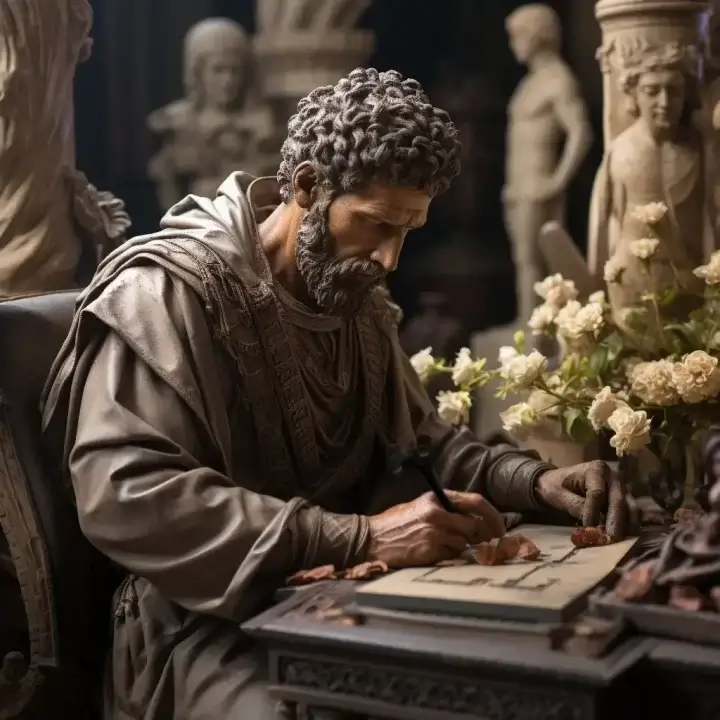
Marcus never lost his focus on Nature or Wisdom, even while he failed to follow the lessons of the Stoic sages and masters. However, he was more committed to practicing Stoicism than delving into its philosophical principles of physics, logic, and ethics.
He knew vice is the only true evil, to be shunned at all times. Marcus struggled with controlling his anger, so he often reminded himself of its futility and liability.
“What then if they get angry? Will you lose your temper too? Will you not rather calmly go through the sequence of letters, telling each one in turn? So also in your life here remember that every duty is the completed sum of certain actions. You must observe these, without being disconcerted or answering others’ resentment with your own, but following each purpose methodically to its end.” — Meditations, 6.26
The main idea of Stoicism that affected Marcus was working patiently toward social justice and political ideals. He took each day as an opportunity to do good to his fellow Romans while accepting their imperfections. He obstinately looked for opportunities in obstacles. Most importantly, he kept death in mind at all times (the practice of Memento Mori).

Marcus Aurelius As A Roman Emperor
Marcus Aurelius was the most powerful man on earth for 20 years during his reign over the vast Roman Empire.
When Marcus Aurelius ascended to the throne, the Empire stretched from Rome to northern England, and Germania, Gaul, and Britannia were under Roman rule. But his reign was tumultuous, even though Marcus was one of the last emperors of the golden era.
He had to contend with constant warfare with various tribes. During his reign, he fought the Roman-Parthian War and the Marcomannic Wars, the latter lasted a 12-year period from 166 to 180. He defended attacks from the Germanic, Sarmatian, Quadi, and Iazyges tribes, and fought rebellions in Northern Italy and Egypt.
Marcus also had to deal with a scheming governor who attempted to usurp him. General Avidius Cassius, who had declared himself Caesar, was his longtime and trusted friend in charge of Syria. Marcus sent out a team to capture, not kill Cassius. He intended to pardon him, but an assassin killed Cassius. Marcus once more showed his kindness when he spared the lives of Cassius’ friends and family.
Towards the second half of his reign, a plague wreaked havoc in Rome. It was a deadly pandemic that killed five million Romans, and eventually took Marcus’ life.
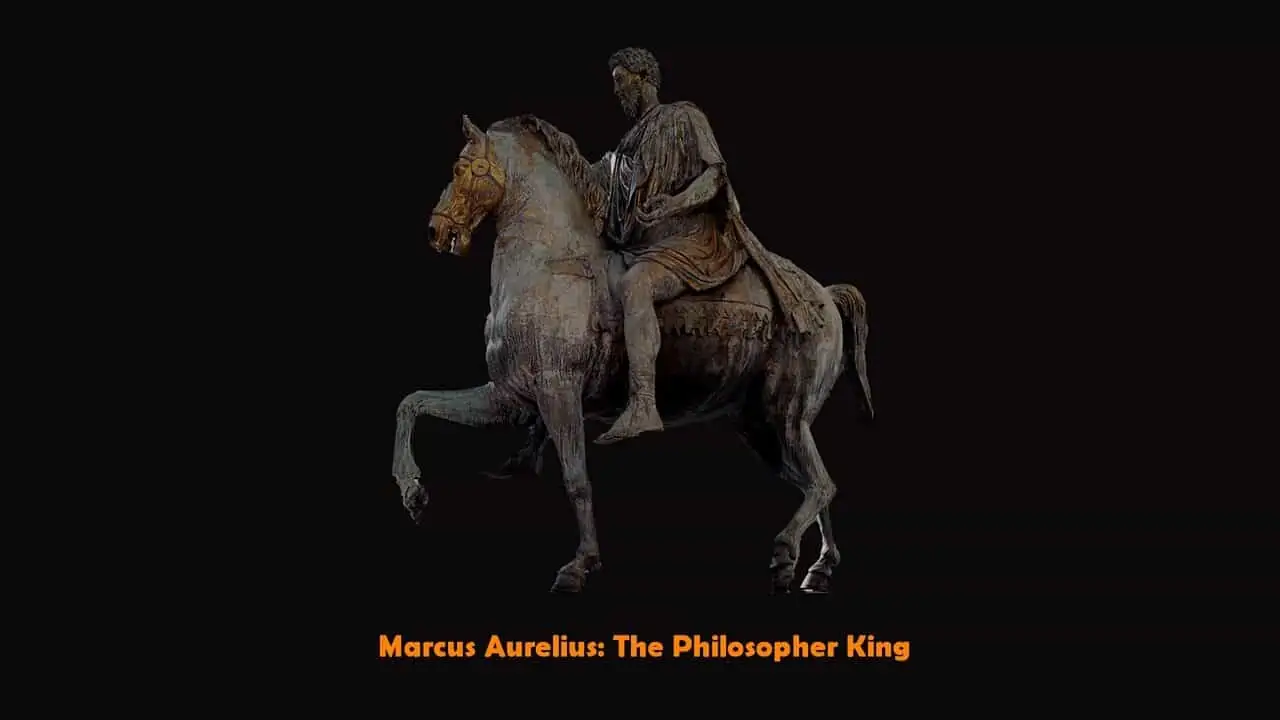
Meditations: Marcus Aurelius’ Legacy
Marcus, even when at battles, never veered away from his role as a Stoic.
He authored his famous Meditations during these campaigning years. The book, originally a personal journal, might have been his way of breaking away from the battleground affairs and indulging in philosophical monologue for mental stimulation.
Meditations also reveals a moral investigation, a search for guidance, as he made crucial decisions with no other source of reflection except himself.
“Everything — a horse, a vine — is created for some duty. This is nothing to wonder at: even the sun-god himself will tell you, ‘This is a work I am here to do,’ and so will all the other sky-dwellers. For what task, then, were you yourself created? For pleasure? Can such a thought be tolerated?” — Marcus Aurelius
Meditations is without a doubt one of the greatest works of philosophy. Its lessons still remain relevant in modern times. It is said that Marcus never wanted his journal to be read by others, and wished it burned at his death.
Meditations, however, survived. When Marcus died, a secret posse unknown to history took over Meditations; even his children were oblivious of its presence. They closely guarded it for over 1400 years until its first publishing.
Meditations is Marcus’ legacy. It doesn’t follow a clear timeline of events. There is no logical separation of chapters, either. Marcus often writes in ways that are difficult to decipher in a single reading. He uses Stoic terminology, offering no explanations.
Marcus’ entries follow several patterns, including reminding himself of basic Stoic theory, arguing with himself, and reframing situations. — Gregory Lopez
This journal was meant to help morally improve Marcus, but it has been inspiring others for thousands of years since its creation. The main themes he covers are virtue, time, death, fate, and cycles of change in the cosmos. Today, people routinely share quotes from Meditations on social media.
Meditations took shape during his most challenging years. It reveals how he tried to live in agreement with Nature and separate himself from his individual perspective in an attempt to understand his position from a cosmic perspective.
FAQ’s
When and where was Marcus Aurelius born?
When and how did Marcus Aurelius die?
What did Marcus say about love?
• • •
Author Bio: Jane Palombo is a freelance writer who studied at NYU and the University of Pittsburgh. Jane uses her writing skills to share helpful information about the importance of wellness and mindfulness in everyone’s life. Find her on LinkedIn.
Exhaustively rewritten and edited by Sandip Roy.
√ If you enjoyed this, please share it.

